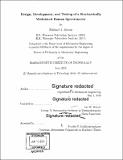Design, development, and testing of a stochastically modulated Raman spectrometer
Author(s)
Zervas, Michael Jay.
Download1121202109-MIT.pdf (21.34Mb)
Other Contributors
Massachusetts Institute of Technology. Department of Mechanical Engineering.
Advisor
Ian W. Hunter.
Terms of use
Metadata
Show full item recordAbstract
Detection of cancerous tumors and identification of counterfeit medications are just two examples that demonstrate the chemical specificity provided by Raman Spectroscopy. Yet, the widespread use of Raman Spectroscopy as an analytical tool has been limited to large bench-top systems in controlled laboratory environments. Existing technology, specifically in portable or handheld formats, suffers from a high false detection rate and relatively low sensitivity compared to other spectroscopic techniques. The present work addresses these issues through the design and development of a new system architecture that stochastically modulates the laser excitation wavelength. Small changes in excitation will proportionally shift the Raman scatter while having little effect on other spectral artifacts, including fluorescence. A custom confocal Raman Spectrometer was built and characterized that can rapidly shift the excitation wavelength by selectively straining an externally mounted Fiber Bragg Grating (FBG). When combined with a super-luminescent diode (SLED), a modulation bandwidth of over half a nanometer was achieved. The functionality of the system was tested and benchmarked against Raman spectra that have been well characterized in literature. In addition, a novel signal processing approach was used to obtain a difference spectrum from a stochastic input excitation sequence. Simulations were conducted that compare the performance to conventional methods, which were then verified experimentally. Results indicate that the stochastic modulation was able to effectively isolate Raman scatter with a higher SNR compared to conventional methods. Finally, it was demonstrated that the developed system could be applied to Surface Enhanced Raman Spectroscopy (SERS). SERS substrates increase the Raman scatter signal, but also compete with significant fluorescence and a strong background signal. Rhodamine 6G, a fluorescent dye, was tested using the developed system on a SERS substrate. Concentrations on the order of several hundred parts per million (ppm) were successfully measured, with significantly lower limits of detection possible. The experimental data shows that the combination of SERS with stochastically modulated techniques reduces the false detection rate and improves the detection sensitivity by several orders of magnitude, addressing both of the major existing limitations.
Description
Thesis: Ph. D., Massachusetts Institute of Technology, Department of Mechanical Engineering, 2019 Cataloged from PDF version of thesis. Includes bibliographical references (pages 133-139).
Date issued
2019Department
Massachusetts Institute of Technology. Department of Mechanical EngineeringPublisher
Massachusetts Institute of Technology
Keywords
Mechanical Engineering.